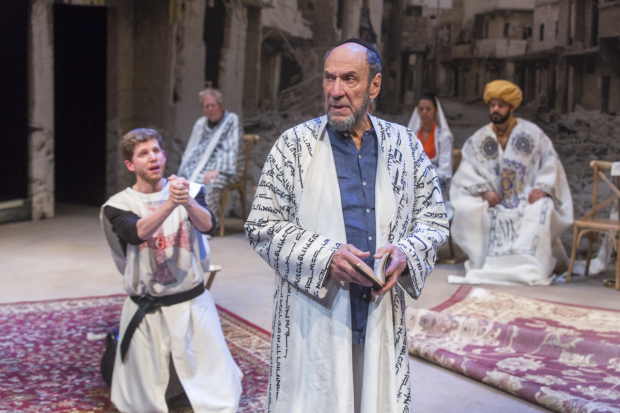Nathan the Wise
F. Murray Abraham stars in a revival of Gotthold Ephraim Lessing’s play about religious understanding in medieval Jerusalem.

(© Richard Termine)
Depending on whether you're a glass-half-full or glass-half-empty kind of person, you may walk away from Nathan the Wise with a renewed sense of hope or a rush Sisyphean despair. Written by 18th-century German philosopher Gotthold Ephraim Lessing, the play examines the volatile yet intimate relationship between the three Abrahamic religions: Judaism, Christianity, and Islam. It is now receiving a rare revival at Classic Stage Company. This excellent and earnest production highlights just how radical the play's message of religious tolerance was for its time — and sadly, still is today.
The Enlightenment Era drama was so revolutionary, in fact, that it was never produced during Lessing's lifetime, and he expressed doubts that it ever would be. While its themes are considerably less controversial for contemporary Western audiences, Nathan the Wise is still seldom produced due to its unwieldy nature (unedited, it can run over five hours). Using a zippy two-hour adaptation by Edward Kemp, Classic Stage Company makes a good argument for the play's continuing relevance, especially since religious bigotry still stubbornly persists.
The story takes place in 1192 Jerusalem, during the Third Crusade. Nathan (F. Murray Abraham) is a wealthy Jewish merchant living with his daughter, Rachel (Erin Neufer), and her Christian attendant, Daya (Caroline Lagerfelt). When a Templar knight (an angry and intense Stark Sands) saves Rachel from a fire, Nathan looks for some way to thank him. The knight is a prisoner of the Muslim Sultan Saladin (the jolly Austin Durant), who spared his life because of his striking resemblance to his late brother. Despite his affinity for the Christian soldier, Saladin continues to wage an expressive war against the crusaders and is in desperate need of funds. His sister, Sittah (Shiva Kalaiselvan), suggests that Nathan might be good for a loan, especially due to his relationship to the court treasurer, Al-Hafi (the very funny George Abud).

(© Richard Termine)
The Sultan summons Nathan to his palace and asks him a delicate question — which faith is the most enlightening: Islam, Christianity, or Judaism? He hopes that Nathan's discomfort will lead him to offer the loan just to change the subject. Instead, Nathan tells him a tale about a father who, rather than choosing just one of his three sons to give his favorite ring, makes two copies and mixes them up until they are indistinguishable. It's a beautiful story, but it doesn't consider that the sons might spend the rest of their lives getting the jewelry reappraised.
Defiantly proving that the controversy surrounding his troubled Africa-themed production of Mother Courage did nothing to shake his resolve to relate classic plays to modern situations, director Brian Kulick stages Nathan the Wise in front of a giant photograph of what appears to be a Gaza street scene following an Israeli missile strike. In typical Brechtian fashion, Kulick first introduces us to the actors out of character, an overture that devolves into a shouting match in Hebrew and Arabic, suggesting that this performance actually takes place in the Holy Land of 2016.
While somewhat heavy-handed, this approach actually complements Lessing's parabolic drama, a story seemingly contrived only to express the moral observation that Jews, Christians, and Muslims are actually more closely related than they first appear. This is not just fanciful deist hokum on Lessing's part: Mixed-faith ancestry is not uncommon in older sabra families, and intermarriage is a tradition at least as old as Esther (the Jewish queen to the Zoroastrian king of Persia). With a thick air of political tension pervading a complicated web of personal relationship between members of different tribes, Nathan the Wise is as germane to the Jerusalem of 2016 as it is to the one of 1192.
Scenic designer Tony Straiges suggests both eras with his minimalist yet effective scenic design, which employs both Middle Eastern rugs and rehearsal studio chairs. Anita Yavich costumes the actors in white robes and tunics bearing text that corresponds to the faith of the wearer (Arabic for the Sultan, Hebrew for Nathan, Latin for the Templar). There are differences between the various outfits, but much of it amounts to just words.

(© Richard Termine)
Leading the cast as Nathan, F. Murray Abraham (who starred in an acclaimed production of Shakespeare's The Merchant of Venice at Theater for a New Audience) turns out to be the perfect choice to embody this magnanimous anti-Shylock. "I've all this money in the house," he says to the Sultan, "maybe you could put it to good use." The line garners laughs and would turn the play into self-satire, was it not delivered by so believable a performer. Abraham's Nathan remains unfailingly wise throughout, an idyllic patriarch of multicultural children.
While Nathan the Wise skirts around some of the more troubling aspects shared by all three Abrahamic religions (notice how Nathan's allegorical father bestows his rings on three sons, not three daughters), one can nonetheless appreciate Lessing's assertion that these faiths (which account for over 4 billion total followers) have more in common than not. Of course, the ever-present devastation on the upstage wall serves as a reminder that a huge proportion of that 4 billion still haven't gotten the message.









